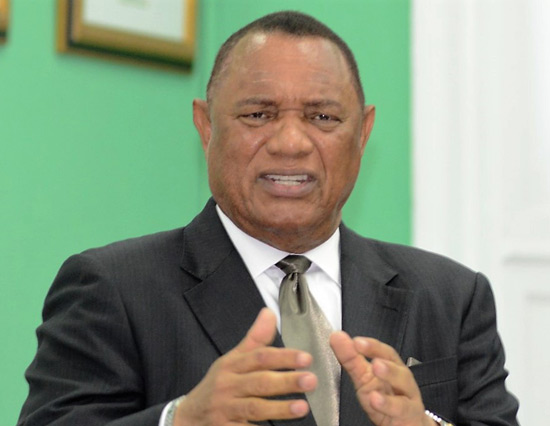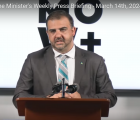
NASSAU, The Bahamas — Prime Minister and Minister of Finance the Rt. Hon. Perry Christie told the House of Assembly, on October 19, 2016, that the losses to The Bahamas from Hurricanes Matthew and Joaquin could total hundreds of millions of dollars.
“Up to the present time, we were indicating that Hurricane Joaquin was over $100 million in cost,” Prime Minister Christie said. “The Ministry of Finance is projecting $200 million as the cost for Hurricane Joaquin.
“In fact we have a running debate between the Financial Secretary and myself, who’s projecting that the loss to the country — combined loss of Matthew and Joaquin — would be some $800 million.”
“While final damage estimates are not known — and I have indicated to you the estimates of the Ministry of Finance — it is clearly accepted that the damages from Hurricane Matthew would be multiple times that of Joaquin, with the reality that the reconstruction programme for Joaquin is not yet completed,” he added.
So the response to a storm, with its damage to public and private infrastructure at once in a generational level, has to be different from responses in the past, he noted.
“It also has to be comprehensive and take into account the hard-earned fiscal recovery efforts of the Government,” Prime Minister Christie said.
In the Government’s “traditional toolkit” for hurricane reconstruction, Prime Minister Christie said, there is the Exigency Order, which was issued effective October 7, 2016.
That allowed individuals in the impacted islands of New Providence, Grand Bahama, Berry Islands and North and Central Andros to import on a duty and VAT free basis the goods necessary to repair their dwellings, he said.
“In addition, it also allowed for the duty free import of generators, motor vehicles and for the first time bottled water for a two-month period,” he added.
Prime Minister Christie pointed out that, in a significant departure from the existing policy and in recognition of the enormity of the damage and the need to provide assistance quickly and efficiently as possible, he had authorized the delegation of approval of duty-free status by the National Emergency Management Agency (NEMA).
This means, he noted, that individuals impacted by the storm upon the completion of the relevant NEMA form can import goods or purchased goods duty or VAT free without the prior approval of NEMA.
“The only exceptions to this rule are for purchases or imports where the value is greater than $10,000 or for those individuals seeking to replace motor vehicles,” he said. “The Exigency Order has also been granted for 180 days a departure from the traditional 90 days.”
The Government has also, for the first time, incentivized the business community by agreeing to give — after talks with the Chamber of Commerce — a mechanism by which businesses can see a reduction in their tax bill if they donate to the Bahamas Disaster Relief Fund, Rebuild Bahamas or any other charity duly recognized by the Government, Prime Minister Christie said. Legislation, he added, would soon be presented to the House to give legal effect to this agreement.
“These steps, impressive as they may be, in the normal course do not provide the direct impetus which we believe is necessary to start the rebuilding effort,” he noted.
Prime Minister Christie pointed out that, in previous public statements, he made it known that the Government felt it necessary to seek special authority from Parliament to borrow to fund the rebuilding effort.
He said he also posed the question as to whether it was time for the Government to consider some levy to offset the cost of hurricane reconstruction, which had grown exponentially as the country developed and because of climate change which has increased the frequency of negative impacts of the weather on this country.
Prime Minister Christie said that he had indicated that Hurricane Joaquin’s rebuilding effort would cost the Government in the region of $200 million. This, he said, would be paid for foregone tax revenue via Exigency Order and direct expenditure.
“In the normal course it will take the Government years to fully rebuild with replacement of public infrastructure being secondary to rebuilding homes,” Prime Minister Christie said.
Hurricane Matthew is going to cost the Government in the region of $600 million, he continued, indicating that in one year the Government is faced with, in those circumstances, an $800 million obligation — which is roughly 9% of our GDP and 40% of The Bahamas’ national budget.
So it is only rational that the question is posed, he stated, as it was a dialogue which had to be take place.
Prime Minister Christie stated that when he indicated Government’s intention to seek approval for hurricane recovery-related funding, he was doing so with the assurance of the technical staff of the Ministry of Finance that the funding to service that debt could be derived from the existing tax system in a policy neutral manner, meaning no change in existing rates.
“This assurance was done by the way of study done on behalf of the Ministry by external experts,” Prime Minister Christie said. “This study was commissioned and presented to the Ministry prior to arrival of Hurricane Matthew.”
“The key finding of the study is that with a more structured compliance programme the revenue base could grow by 10% in the short term and up to 20% in the medium term of 3 to 5 years,” he added.
“The study indicated that with the investments made by this administration in information technology to support tax collection efforts, that this was not only doable be achievable.”
Prime Minister Christie noted that it was with that background that the Government approached the commercial banks in The Bahamas.
“All of these banks have stake in the economy and are deeply invested in The Bahamas,” Prime Minister Christie said. “It is with gratitude and pride that I note that all of the banks contacted have readily agreed to participate in the financing that we are about to present by way of Resolution to Parliament.”
He also noted that ordinary citizens and residents of The Bahamas have also expressed an effort in participating in this effort, and, in this respect the Ministry of Finance has designed a two tranche financing — a tranche for commercial banks of $120 million and tranche for the public of $30 million.
“In addition, the Central Bank has recommended that non-residents with a nexus to The Bahamas be allowed to participate in this offering,” Prime Minister Christie said.
This recommendation by the Central Bank, had been accepted by the Government the day before, he said. Those funds would be exclusively used for the reconstruction effort, he added.
“The initial focus on the reconstruction effort has been in ensuring restoration of access to essential services, such as electricity and water,” Prime Minister Christie said. “The next phase would be the repair and reconstruction of homes and, parallel to that phase, reconstruction of public infrastructure would be addressed.”
“The entire Government would be involved in all phases of this effort working with local and international partners.”
By Eric Rose
Bahamas Information Services





